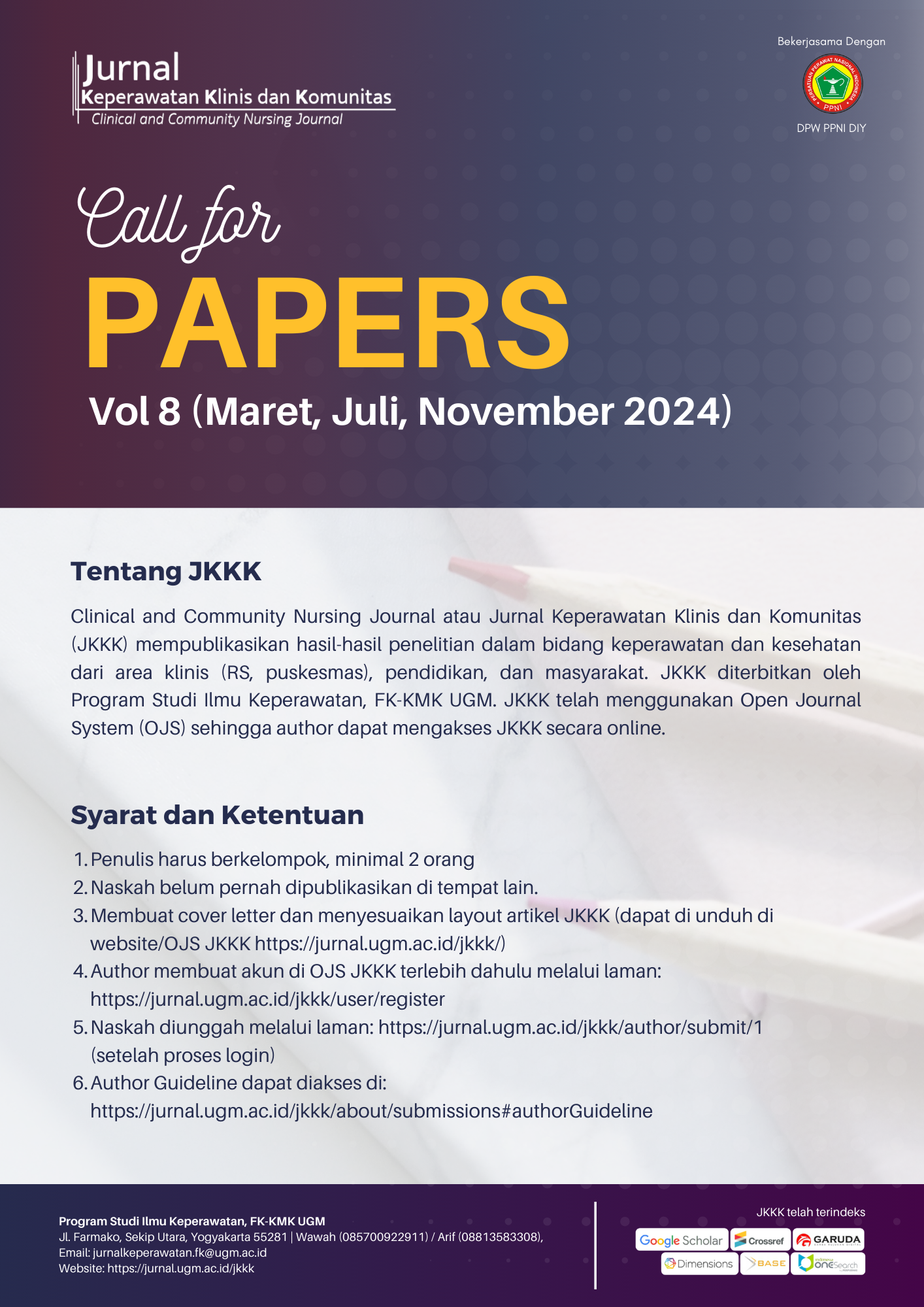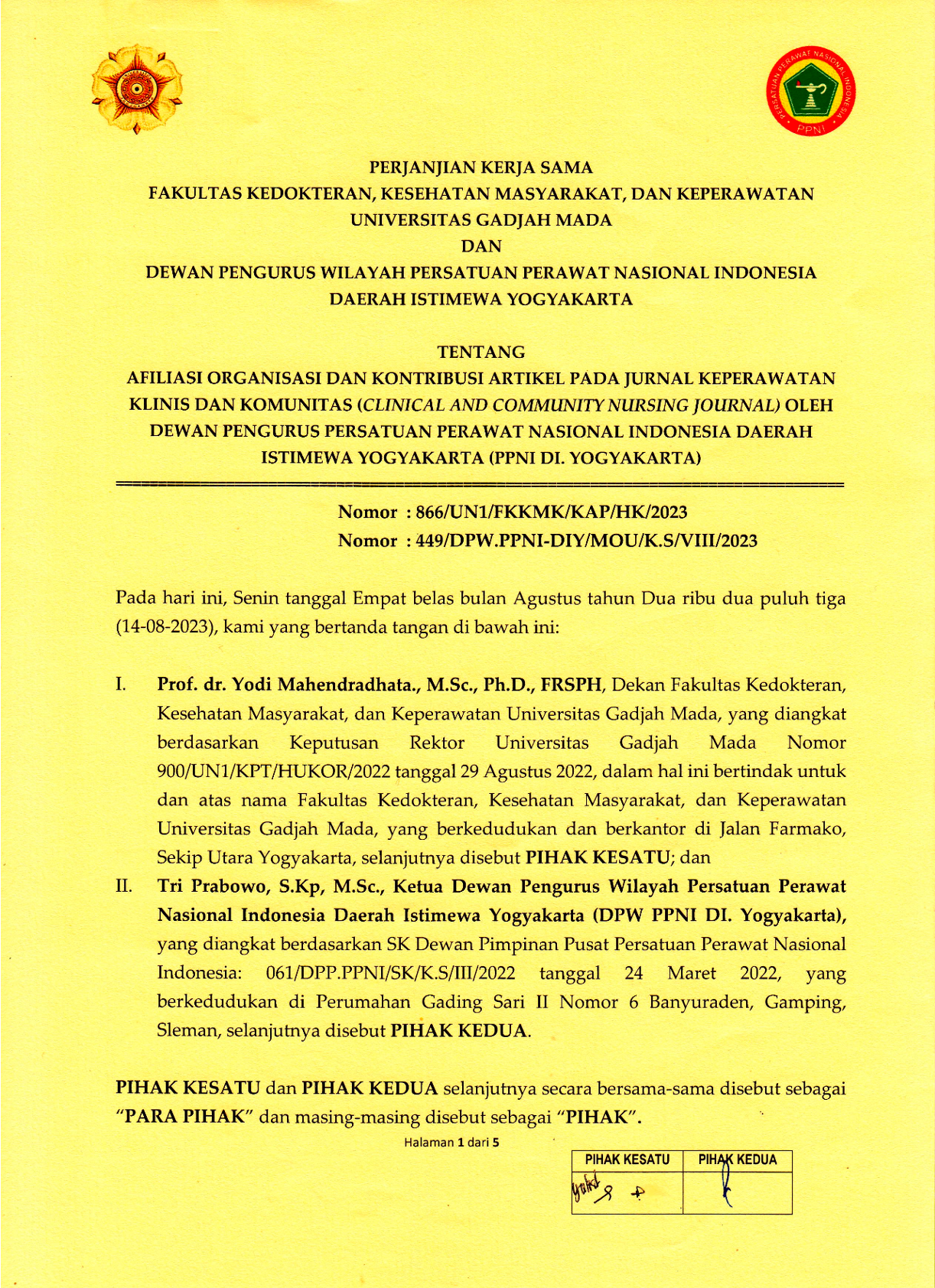Hubungan Antara Kedekatan Ibu dan Anak dengan Perilaku Psikososial Anak Usia Prasekolah
Khana Sholaita(1*), Lely Lusmilasari(2), Fitri Haryanti(3)
(1) Program Studi Ilmu Keperawatan, Fakultas Kedokteran, Kesehatan Masyarakat, dan Keperawatan, Universitas Gadjah Mada
(2) Departemen Keperawatan Anak dan Maternitas Fakultas Kedokteran, Kesehatan Masyarakat, dan Keperawatan, Universitas Gadjah Mada
(3) Departemen Keperawatan Anak dan Maternitas Fakultas Kedokteran, Kesehatan Masyarakat, dan Keperawatan, Universitas Gadjah Mada
(*) Corresponding Author
Abstract
Background: Preschool age is at risk of experiencing psychosocial behavior problems which, if not treated immediately, will have an impact on development. The closeness of mother and child is basic in emotional development and social relationships.
Objective: Knowing the relationship between mother and child closeness and the psychosocial behavior of preschool children
Method: This research is a descriptive analytical research with a research design cross sectional which will be carried out in April – June 2022 in Sleman Regency, Yogyakarta. The research involved 118 respondents taken through the method consecutive sampling. Instrument Child Parent Relationship Scale (C-PRS) is used to measure the closeness of mother and child and Preschool Pediatric Symptom Checklist (PPSC) to measure children's psychosocial behavior. Data were analyzed using correlation tests Spearman.
Results: 78% of preschool children's psychosocial behavior is normal, and 22% are at risk of experiencing psychosocial problems. The most common psychosocial problems are internalization and attention problems. Mark mean The warm dimension of closeness between mother and child is higher than the conflict dimension. The warm dimension was negatively correlated with the risk of psychosocial behavior problems (r = -0,190; p = 0,039) while the conflict dimension is positively correlated with the risk of psychosocial problems (r = 0,410; p = 0,000).
Conclusion: There is a relationship between the closeness of mother and child and the psychosocial behavior of preschool children. Warm mother-child closeness reduces the risk of psychosocial behavior problems. The closeness between mother and child that tends to be negative (conflict) increases the risk of psychosocial behavior problems.
INTISARI
Latar belakang: Usia prasekolah berisiko mengalami masalah perilaku psikososial yang apabila tidak segera ditangani akan berdampak pada perkembangan. Kedekatan ibu dan anak menjadi hal dasar dalam perkembangan emosional dan hubungan sosial.
Tujuan: Mengetahui hubungan antara kedekatan ibu dan anak dengan perilaku psikososial anak prasekolah
Metode: Penelitian ini merupakan penelitian deskriptif analitik dengan rancangan penelitian cross sectional yang dilakukan pada April – Juni 2022 di Kabupaten Sleman, Yogyakarta. Penelitian melibatkan 118 responden diambil melalui metode consecutive sampling. Instrumen Child Parent Relationship Scale (C-PRS) dipakai untuk mengukur kedekatan ibu dan anak dan Preschool Pediatric Symtomp Checklist (PPSC) untuk mengukur perilaku psikososial anak. Data dianalisis dengan uji korelasi Spearman.
Hasil: Perilaku psikososial anak prasekolah 78% normal, dan 22% berisiko mengalami masalah psikososial. Masalah psikososial yang paling banyak adalah internalisasi dan masalah perhatian. Nilai mean kedekatan ibu dan anak dimensi hangat lebih tinggi dari pada dimensi konflik. Dimensi hangat berkorelasi negatif dengan risiko masalah perilaku psikososial (r = -0,190; p=0,039) sedangkan dimensi konflik berkorelasi positif dengan risiko masalah psikososial (r = 0,410; p = 0,000).
Simpulan: Terdapat hubungan antara kedekatan ibu dan anak dengan perilaku psikososial anak prasekolah. Kedekatan ibu dan anak yang hangat menurunkan risiko masalah perilaku psikososial. Kedekatan ibu dan anak yang cenderung negatif (konflik) meningkatkan risiko masalah perilaku psikososial.
Keywords
Full Text:
PDFReferences
DeLaune SC, Ladner. Nursing Fundamentals: Australia & New Zealand 2nd Edition; Cengage: Australia; 2011.
Poulou MS. Emotional and Behavioural Difficulties in Preschool. J Child Fam Stud. 2015; 24(2): 225–36. https://doi.org/10.1007/s10826-013-9828-9.
Monteiro R, Rocha NB, Fernandes S. Are Emotional and Behavioral Problems of Infants and Children Aged Younger Than 7 Years Related to Screen Time Exposure During The Coronavirus Disease 2019 Confinement? An Exploratory Study in Portugal. Front Psychol. 2021; 12(2): 1-9. https://doi.org/10.3389/fpsyg.2021.590279.
Herndon KJ, Bailey CS, Shewark EA, Denham SA, Bassett HH. Preschoolers’ emotion expression and regulation: Relations with school adjustment. J Genet Psychol. 2013;174(6):642–63. https://doi.org/10.1080/00221325.2012.759525.
Farida LN, Naviati E, Keperawatan J, Kedokteran F, Diponegoro U. Mental Emosional Pada Anak Usia Prasekolah. 2013;222–8. https://jurnal.globalhealthsciencegroup.com/index.php/PICNHS/article/view/267.
Niswah K. Analisis Faktor Yang Berhubungan Dengan Perilaku Anak Prasekolah di Kecamatan Saptosari Kabupaten Gunung Kidul Yogyakarta [Skripsi]. Yogyakarta: Universitas Gadjah Mada; 2018.
Sholikha J, Irwanto I, Fardana N NA. Kualitas Interaksi Orang Tua Dan Anak Terhadap Perkembangan Emosional Anak. Indones Midwifery Heal Sci J. 2021; 3(3): 243–8. http://e-journal.unair.ac.id/index.php/IMHSJ%0AKUALITAS.
Subagya AN, Hartini S, Nurjannah I. Effect of Foot Reflexology on behavioral and Emotional Problems in Preschool. 3rd Int Jt Congr Nurs Sci. 2019;31(S3):471–7. http://dx.doi.org/10.1016/j.enfcli.2020.10.048.
de Moor EL, Denollet J, Laceulle OM. Social inhibition, sense of belonging and vulnerability to internalizing problems. J Affect Disord [Internet]. 2018; 225(June 2017): 207–13. https://doi.org/10.1016/j.jad.2017.08.034.
Subagya AN. Pengaruh Pijat Refleksi Kaki terhadap Perilaku Anak Prasekolah [Skripsi]. Yogyakarta: Universitas Gadjah Mada; 2019.
Lincoln CR, Russell BS, Donohue EB, Racine LE. Mother-Child Interactions and Preschoolers’ Emotion Regulation Outcomes: Nurturing Autonomous Emotion Regulation. J Child Fam Stud. 2017; 26(2): 559–73. http://dx.doi.org/10.1007/s10826-016-0561-z.
Hong YR, Park JS. Impact of Attachment, Temperament and Parenting on Human Development. 2012; 55(12): 449–54. https://doi.org/10.3345/kjp.2012.55.12.449.
Kochanska G, Kim S. Difficult Temperament Moderates Links between Maternal Responsiveness and Children’s Compliance and Behavior Problems in Low-Income Families Grazyna. Child Psychol Psychiatry. 2013; 54(3): 323–32. https://doi.org/10.1111/jcpp.12002.
Halu SAN, Murti B, Tamtomo D. Effect of Prematurity , Birthweight , Maternal Stress , Socio-economic Status, and Mother-Child Intimacy on the Development of Preschool Children in Surakarta. 2017; 187–99. https://doi.org/10.26911/thejmch.2017.02.03.0.
Rahmawati M, Latifah M. Gadget Usage, Mother-Child Interaction, and Social-Emotional Development among Preschool Children. J Ilmu Kel dan Konsum. 2020; 13(1): 75–86. http://dx.doi.org/10.24156/jikk.2020.13.1.75.
Bungawali AN, Retnowati S. Kelekatan Sebagai Mediator Antara Konflik Peran yang Dialami oleh Ibu Bekerja dan Regulasi Emosi Anak Usia Prasekolah di Makassar [Skripsi]. Yogyakarta: Universitas Gadjah Mada; 2022.
Prabowo RDB, Aswanti M. Hubungan Attachment Ibu-Anak dan Ayah-Anak Dengan Kemandirian Pada Remaja Akhir [Skripsi]. Jakarta: Universitas Indonesia; 2014.
Purnama RA, Wahyuni S. Kelekatan (Attachment) pada Ibu dan Ayah Dengan Kompetensi Sosial pada Remaja. J Psikol. 2017; 13(1): 30-40. http://dx.doi.org/10.24014/jp.v13i1.2762.
Driscoll, K, & Pianta R. Mothers’ and Fathers’ Perceptions of Conflict and Closeness in Parent-Child Relationships during Early Childhood - ProQuest. J Early Child Infant Psychol. 2011; 7: 1–24. http://search.proquest.com.qe2a-proxy.mun.ca/docview/1461360050?accountid=12378.
Sheldrick RC, Henson BS, Merchant S, Neger EN, Murphy JM, Perrin EC. The Preschool Pediatric Symptom Checklist (PPSC): Development and Initial Validation of A New Social/Emotional Screening Instrument. Acad Pediatr. 2012; 12(5): 456–67. https://doi.org/10.1016/j.acap.2012.06.008.
Feoh FT. Studi Fenomenologi : Stress Narapidana Perempuan. Nurs Updat. 2020; 11(3): 7–16. https://doi.org/10.36089/nu.v11i3.214.
Tobing CPR, Wulandari ISM. Tingkat Kecemasan Bagi Lansia yang Memiliki Penyakit Penyerta di Ttengah Situasi Pandemik Covid-19 Di Kecamatan Parongpong, Bandung Barat. Coping Community Publ Nurs. 2021;9(2):135. https://jurnal.harianregional.com/coping/full-71693.
Clifford S, Lemery-Chalfant K, Goldsmith HH. The Unique and Shared Genetic and Environmental Contributions to Fear, Anger, and Sadness in Childhood. Physiol Behav. 2015; 176(1): 139–48. https://doi.org/10.1111/cdev.12394.
Burlaka V, Bermann EA, Graham-Bermann SA. Internalizing Problems in At-risk Preschoolers: Associations with Child and Mother Risk Factors. J Child Fam Stud. 2015; 24(9): 2653–60. http://dx.doi.org/10.1007/s10826-014-0067-5.
Tyng CM, Amin HU, Saad MNM, Malik AS. The Influences of Emotion on Learning and Memory. 2017; 8: 1-22. https://doi.org/10.3389%2Ffpsyg.2017.01454.
Cristina M, Veloz T, Luisa R, Marino DF, Renato L, Carreiro R. Associations between Inadequate Parenting Practices and Behavioral Problems in Children and Adolescents with Attention Deficit Hyperactivity Disorder. 2015:1-6. https://doi.org/10.1155/2015/683062.
Faraone S V. Genetics of attention de fi cit hyperactivity disorder. 2019; 24(4): 562–575. https://doi.org/10.1038/s41380-018-0070-0.
Lundervold AJ, Tormod B, Lundervold A. Inattention in primary school is not good for your future school achievement — A pattern classification study. 2017; 12(11): 1–15. https://doi.org/10.1371/journal.pone.0188310.
Thompson R, Kaczor K, Lorenz DJ, Bennett BL, Meyers G, Pierce MC, et al. Is the use of physical discipline associated with aggressive behaviors in young children? HHS Public Access. 2018; 17(1): 34–44. https://doi.org/10.1016%2Fj.acap.2016.02.014.
Suurland J, Van der Heijden KB, Huijbregts SC, Smaling HJA, De Sonnerville LMJ, Van Goozen SHM, et al. Parental perceptions of aggressive behavior in preschoolers: inhibitory control moderates the association with negative emotionality. Child Dev 87. 2016; 87(1): 256–69. https://doi.org/10.1111/cdev.12455.
Santos M, Queiro FC, Barreto L, Santos DN. Prevalence of behavior problems and associated factors in preschool children from the city of Salvador , state of Bahia , Brazil. 2016; 46–52. https://repositorio.ufba.br/bitstream/ri/19210/3/Art%20Per%20Nac.%20Darci%20Santos.%202015.pdf.txt.
Leijten P, Gardner F, Knerr W, Overbeek G. Parenting behaviors that shape child compliance : A multilevel meta-analysis. PLoS One. 2018; 1–15. https://doi.org/10.1371/journal.pone.0204929.
Girard LC, Doyle O, Tremblay RE. Maternal warmth and toddler development: support for transactional models in disadvantaged families. Eur Child Adolesc Psychiatry. 2017; 26(4): 497–507. https://doi.org/10.1007/s00787-016-0913-7.
Laras Asih N, Mawarsari Boediman L. Peran Kehangatan Ibu sebagai Moderator Sosialisasi Emosi dan Regulasi Emosi Anak Usia Prasekolah. 2021; 14(1): 21–41. https://journal.untar.ac.id/index.php/provitae/article/view/11424/7141.
Ernadewita, Maiseptian F, Vianis E. Perkembangan Kecerdasan Emosional Anak usia prasekolah. AL-MAHYRA (Jurnal Penelit Dan Pengemb Keilmuan). 2020; 1(1): 1–6. https://ejournal.stai-br.ac.id/index.php/al-mahyra/article/view/29.
Eisenberg N, Cumberland A, Spinrad TL. Parental Socialization of Emotion. Psychol Inq. 1998; 9(4): 241-273. https://doi.org/10.1207/s15327965pli0904_1.
Cheng F, Wang Y, Zhao J, Wu X. Mothers' negative emotional expression and preschoolers' negative emotional regulation strategies in Beijing, China: The moderating effect of maternal educational attainment. Child Abuse Negl. 2018; 84: 74-81. https://doi.org/10.1016/j.chiabu.2018.07.018.
Scott P. Mirabile, Parents' inconsistent emotion socialization and children's socioemotional adjustment,Journal of Applied Developmental Psychology. 2014; 35(5): 392-400. https://doi.org/10.1016/j.appdev.2014.06.003.
Article Metrics
Refbacks
- There are currently no refbacks.
Copyright (c) 2024 Khana Sholaita, Lely Lusmilasari, Fitri Haryanti

Jurnal Keperawatan Klinis dan Komunitas (Clinical and Community Nursing Journal)
collaborates with DPW PPNI DIY
![]()
Jurnal Keperawatan Klinis dan Komunitas (Clinical and Community Nursing Journal) is licensed under a Creative Commons Attribution-ShareAlike 4.0 International License.





